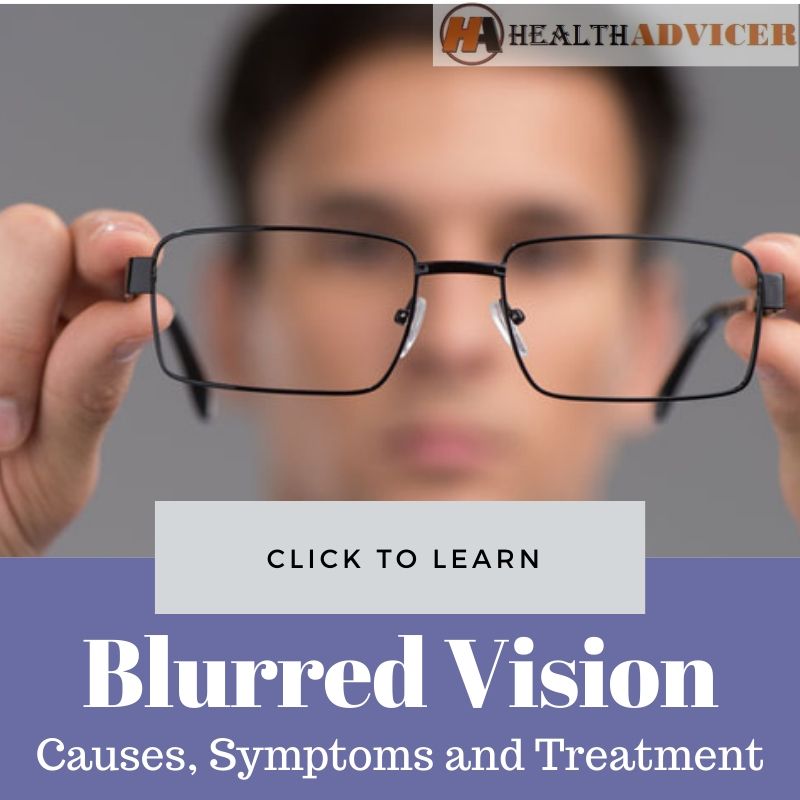Blurred vision can cause problems in seeing things around you properly. You need a clear and sharp vision to perceive the things around you. It also helps you navigate around the world properly. The blurriness of your vision makes it difficult to read and understand simple things. You find it difficult to read the traffic signs, read store name or even miss a step in your home. Your quality of life reduces greatly as you feel someone has put a filter over the eyes. It causes your life to go out of focus. Want to know how to deal with it and overcome the problem? Then, read ahead as you can gain comprehensive information about the reasons causing blurriness and ways to deal with them.
Symptoms Of Blurred Vision

When you experience blurriness, it affects your entire line of sight. In some cases, it just affects the parts of your vision. The problem can affect your peripheral vision or your left/right side of the field of vision. At times, the blurriness affects only one eye. The problem can cause your vision to become clouded or experience dimness. You tend to lose the sharpness of your vision.
Blurry Vision Causes And Treatment Options
You need to give ample importance to your vision health. So, when you experience problems like blurriness, you need to get to the root cause of the problem. You suffer from vision issues due to simple or serious problems. The main causes of blurry vision are:
Myopia
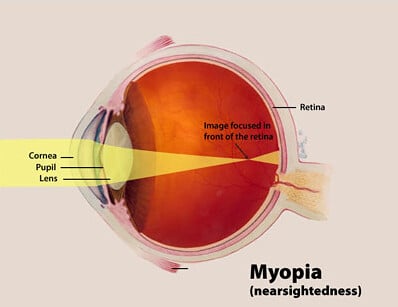
Blurriness in one or both eyes can indicate nearsightedness. Also known as myopia, it is the common eye problem affecting people. People suffering from the condition can experience additional signs like:
- Eyestrain
- Squinting
- Headaches
Myopia occurs due to refractive errors. It can make the objects at a distance appear blurry. So, it becomes difficult to see things afar. The condition requires the following treatment to correct the vision problem:
- Use eyeglasses with prescription lens
- Use contact lens
- Refractive surgery (like PRK or LASIK)
Hyperopia
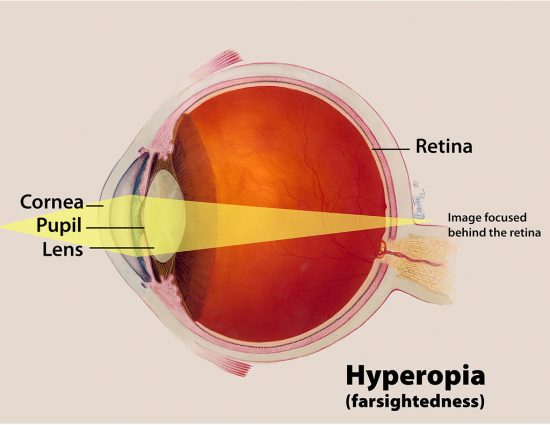
Farsightedness can also cause blurring of your vision. When you suffer from the condition, the objects near you appear blurred. But, the objects afar appear in focus and clear. So, you experience a problem to focus on the objects near you. The condition can trigger the following symptoms:
- Fatigue
- Eyestrain
If you ignore the condition, then it escalates and causes more problems. It results in distant objects appearing blurred. See a doctor get the condition under control with the following treatment options:
- Wear eyeglasses
- Use contact lenses
- Undergo refractive surgery
Astigmatism
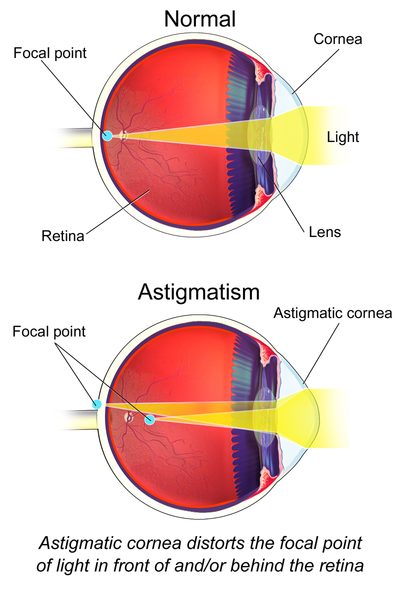
The condition can cause blurriness at all distances. So, you find it difficult to see things near or far. Astigmatism is a type of refractive error caused due to irregularly shaped cornea. Due to the condition, the light cannot come to a single focus point on your retina. So, it fails to produce a sharp and clear vision of objects. The condition needs the following treatment options:
- Eyeglasses
- Use contact lenses
- Refractive surgery
Presbyopia
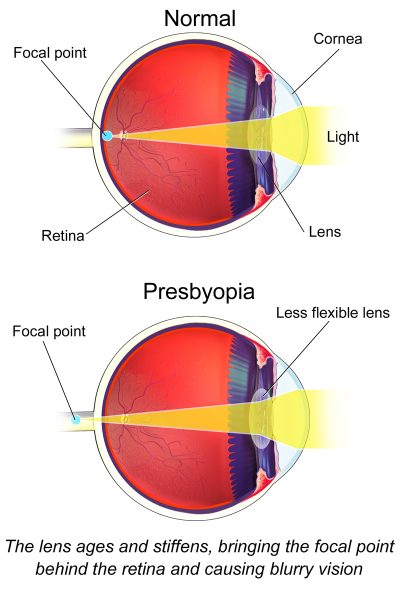
It is an age-related condition. Therefore, people over the age of forty mostly experience the problem. Due to the condition, you may experience difficulty reading a newspaper/magazine or other small print. The blurriness you experience up close makes it difficult to read or see things properly. The symptoms of presbyopia mimic that of hyperopia. So, you can experience the following with the onset of presbyopia:
- Eye strain while reading
- Blurriness of vision
- Reduced ability to focus on objects near to you
But, unlike hyperopia, the condition occurs due to the hardening of the eye lens instead of the shape change of the eye lens. If you suffer from the condition, then you need the following treatment option to correct it:
Use Of Lenses
When you consult an ophthalmologist, the doctor suggests using bifocals, progressive lenses, and reading glasses to correct the issue. Anti-reflective coating, as well as photochromic lenses, is suggested for eyeglasses to correct the refractive errors. It also offers comfort and clarity.
Surgery
You have the different surgical options available to correct the problem like conductive keratoplasty, monovision LASIK, corneal inlays.
Chronic Dry Eyes
As the name suggests, the condition can make your eyes dry. It can affect your eyes in several ways. You can experience the following:
- Fluctuating vision
- Blurred vision
It is important to keep the eyes lubricated for better vision. So, you need the following treatments to manage the condition:
- Artificial tears
- Prescription-strength lubricating eye drops
- Punctual plugs
Pregnancy
Blurriness is common during pregnancy. In some cases, pregnant women experience diplopia (double vision) along with vision blurriness. It is due to the change of shape and thickness of the cornea. The fluctuation of hormones during pregnancy causes the problem. Pregnant women can also experience dry eyes, which can cause vision problems. The condition is not serious. But, it is important to report it to your doctor, the vision disturbances can point towards other serious complications like high blood pressure or gestational diabetes. The problems can cause placental abruption, without management. The condition can become fatal for the baby without treatment.
Ocular Migraines/ Migraine Headaches
Migraines are a painful condition that makes you feel uncomfortable. The headaches can cause the following signs:
- Flickering light
- Temporary blurred vision
- Zigzag pattern or halo
- Sensitivity to light
These symptoms occur at the start of the migraine headache. You have no permanent treatment for migraines. You can only manage the condition with rest, placing cold compress, pain medication, and sleeping the pain off.
Eye floaters
Your vision is blurred by floaters or temporary spots. It drifts in the field of vision. As you age, the gel-like vitreous in your eye begins to liquefy. So, it causes the microscopic tissue with the vitreous to float. The free-floating of the tissue results in casting shadows on your retina. It can lead to the appearance of floaters. You experience the condition as a part of the aging process. But, the temporary spots can appear suddenly. The sudden appearance indicates a detached retina or torn retina. It requires immediate medical attention.
Blurriness After LASIK Surgery
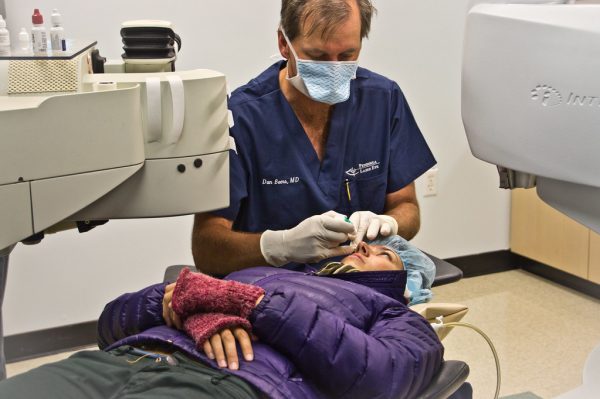
If you have undergone LASIK or any other refractive surgery, then you can experience vision problems for some time. It is a temporary after-effect of surgery and you can see clearly after a couple of days. But, it takes several weeks for complete stabilization of vision.
Eye Drops And Medication
The preservatives in certain medicated eye drops can cause an allergic reaction. Therefore, you suffer from irritation as well as blurry vision. The side effects are usually controlled by using the following options:
- Prescription dry eye medication
- Artificial tears
- Punctal plugs
The medication you take for managing allergies can also cause such signs. In such cases, visit an ophthalmologist to get advice. The specialists can detect if the medication causes the problem or not.
Over-Wearing Contact Lenses
Wearing contact lenses for a long time can cause the condition. So, using any type of contact lenses for longer periods than suggested by your doctor can result in blurriness. Wearing contact lens for long can cause proteins as well as debris in the tear film to accumulate on the lens. It can increase your chances of eye infection and blurry vision. Therefore, follow the guidelines provided with the contact lens to avoid any complications.
Serious Diseases Causing Blurred Visions
In some cases, blurred vision occurs due to a serious underlying health condition. People above sixty years of age need to see an ophthalmologist if they experience sudden blurriness of vision. It can indicate a serious problem leading to permanent vision loss. Therefore, it is important to monitor your body for signs and see a doctor immediately. With early detection and treatment, you can prevent permanent damage to your eyes and safeguard the vision.
Cataracts

The condition occurs due to the clouding of your lens present in the eye. So, it can cause a decrease in your vision. You develop cataract slowly over a while. It affects one or both eyes. The condition can trigger signs like:
- Cloudy vision
- Glares
- Night halos
You need to treat cataracts as early as possible to prevent vision problems. If unremoved, cataracts grow to cloud the lens more, which obstructs vision. It can escalate to the point of blindness. The treatment involves using an artificial lens in place of cataracts that affected the lens. The cataract surgery is hugely successful in restoring your vision.
Glaucoma
You can experience tunnel vision as a result of glaucoma. If you suffer from the condition, you can expect the following symptoms:
- The sudden or gradual narrowing of the field of vision
- Blurry vision at the edges of your field of vision
- The condition needs immediate medical attention. Else, you can experience gradual vision loss and permanent blindness. You have the following treatment option to deal with the condition:
- Prescription eye drops
- Lower eye pressure
- Oral medication
- Laser treatment
- Surgery
Age-Related Macular Degeneration
As the name suggests it occurs in people in their old age. The condition can cause the following signs:
- Blurry vision
- The gradual loss of vision
- No vision in the center of vision field
People suffering from the issue need prompt medical treatment to overcome AMD (Age-related Macular Degeneration). No complete cure is available. But, the treatments aim to slow down the progression of the disease. The treatment includes anti-angiogenic drugs, Laser therapy, or low vision aids.
Diabetic Retinopathy
People suffering from diabetes are at risk of developing diabetic retinopathy. So, experiencing blurry vision means the onset of the condition. It is a serious disease, which needs immediate medical attention. Else, you can damage the retina of your eye. For mild cases, you get need to monitor your sugar levels. For advanced cases, you need the following treatment:
- Photocoagulation
- Vitrectomy
- Injecting medicine into the eyes
Cardiovascular And Other Systemic Diseases
Some serious health conditions like heart diseases, brain hemorrhage, stroke or multiple sclerosis can cause symptoms like:
- Blurry vision
- Double vision
In sudden cases of the appearance of the signs, you need to see the doctor immediately. Your doctor can suggest the apt treatment to deal with the condition properly. With immediate care, you can stop the escalation of the problem and prevent other complications.
If you suffer from minor blurring, which comes and goes, then you never have to worry too much. It can point towards simple issues like over-exposure to sunlight, tiredness or eye strain. By taking rest and applying eye drops can help you overcome the problem with ease. However, the sudden changes in your vision or continuing vision issues like blurriness, tunnel vision, double spots, halos, blind spots or dimness of vision can indicate serious eye conditions or other health problems. So, see a doctor immediately to make a proper diagnosis. It is important to see a doctor as soon as possible when you experience the following symptoms along with blurriness:
- Difficulty speaking
- Severe headache
- Loss of muscle control on one side of the body
- Trouble seeing properly
- Facial drooping
- Trouble seeing
The above-mentioned symptoms suggest the indication of a stroke. If experience eye pain or sudden loss of vision, then it requires prompt treatment. Never undermine the vision problems. You need to take the necessary action to ensure you can see properly.
Diagnosing Blurred Vision
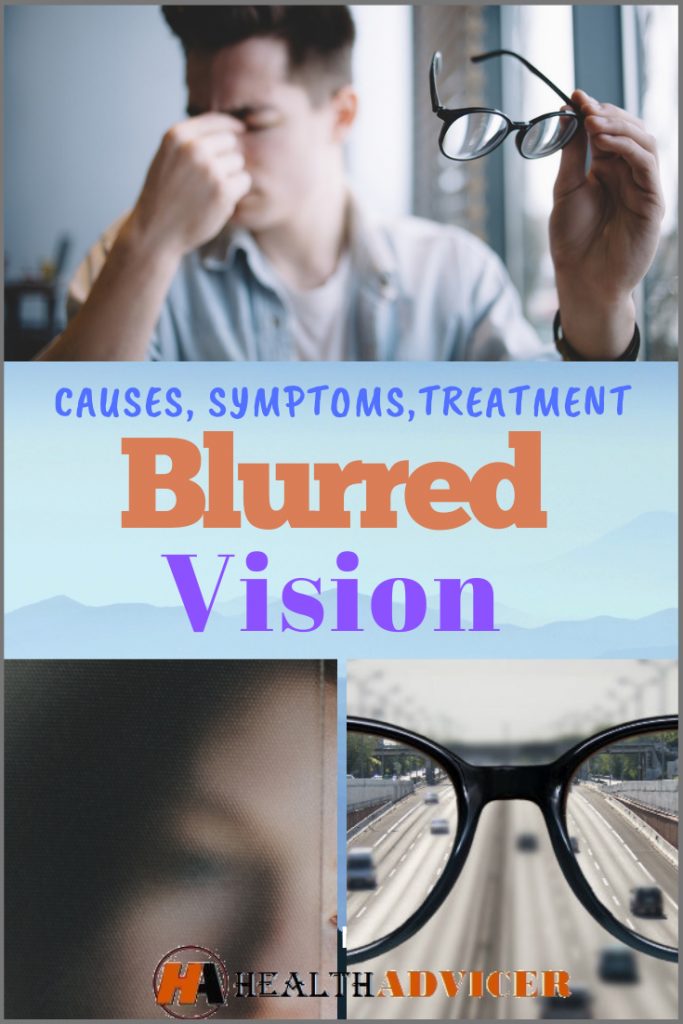
Medical History
Your doctor asks you about the different symptoms you experience along with the blurring of your vision. You must convey exactly when you first started noticing the problem. It is also essential to mention what makes the problem better or worse. The doctor can also ask you about the health conditions you suffer, family history of eye problems, or eye condition you have suffered earlier. Based on the information, the doctor suggests other tests to come to a conclusive analysis.
Eye Tests
The next step is to perform a physical examination of your eyes. The test can assess your vision properly. You need to read an eye chart to check for the blurring of vision. The test can also find short-sightedness and far-sightedness. Your doctor can also suggest the following eye tests to get a clear picture:
- Ophthalmoscopy
- Refraction Test
- Slit Lamp Examination
- Tonometry (The test measures intraocular pressure)
Blood Tests
You need to undergo blood tests. It can help determine the presence of infection, diabetes or other problems that can lead to vision problems. The sample of the blood is taken to the laboratory for assessment. The presence of bacteria can point towards infection. Similarly, the blood test can also help determine the other underlying health problems causing your vision to blur.
Treating Blurred Vision
The treatment of the problem depends on the underlying issue triggering the problem. In some cases, simple issues like a decrease in blood sugar can cause the issue. So, you can rectify the problem by consuming foods high in fast-acting sugar. Depending on the issue, you have the following options to correct blurred vision:
- Eye drops
- Lifestyle changes
- Medications to control the underlying problem
- Laser eye surgeries
Preventive Measures To Avoid Blurred Vision
It is impossible to prevent all the problems causing vision problems. But, you can take steps to ensure the good health of your eyes. The steps suggested will prevent blurred vision due to lifestyle-related causes. So, follow the tips suggested below for your vision health.
Protect Your Eyes
Exposure to harmful radiation of UV rays can affect your eye health. You can also experience vision problems due to prolonged sun exposure. So, offer protection to your eyes. Wear protective glasses when you go out in the sun. It provides broad-spectrum protection to the eyes.
Healthy Diet
Try to include eye-healthy nutrients in your diet. A healthy diet not only keeps you fit but also protects your vision. So, include the following foods in your diet to enhance your vision.
Antioxidants (Lutein)
Dark, leafy vegetables like kale and spinach.
Omega-3 Fatty Acids
Fishes like trout, halibut, sardines or albacore tuna.
Vitamin A
Include vegetables like sweet potatoes, carrots, orange and yellow fruits.
Quit Smoking
Smoking tobacco is harmful to your health. Regular smoking affects your vital organs like the heart, lungs, etc. It also increases your risk of developing eye problems like:
- Cataract
- Macular Degeneration
- Dry Eyes
- Diabetic retinopathy
So, quit smoking to enjoy a healthier lifestyle. It also reduces your risk of developing serious vision problems.
Frequent Eye Examination
You need to include regular eye tests as a part of your healthcare routine. You need to get your eyes tested by optometrists or ophthalmologists to diagnose any eye problem early. With early detection, you start treatments at the early stages of the problem. It reduces the risk of permanent damage to your vision. You need frequent eye testing if someone in your family suffers from a vision problem. It is also significant when you suffer from any medical condition (like diabetes) that can affect your vision. With regular tests, it is possible to reduce eye problems.
Avoid Infections
Eye infections can affect your eyesight and cause blurred vision. Blepharitis, pink eye or stye are common eye infections. You need to take the following preventive measures to avoid any infection.
- Wash your hands before touching your eyes
- Do not share cosmetic
- Use contact lens as per your doctor’s guidelines
- Maintain high standards of hygiene with clothing, bedding or towels
- Avoid excessive rubbing of your eyes
Use Protective Eyewear
You need to use protective eyewear while engaging in activities like home repairs or painting. It increases the possibility of dust and other particles getting into your eyes. You must use googles or safety glasses while operating heavy pieces of machinery or work with chemicals. The protective eyewear is designed to protect the area surrounding the eyes by enclosing it safely. So, it prevents chemicals, particulates, water or other harmful substances from striking the eyes.
Conclusion
The loss of sharpness in your vision can cause blurriness. So, you cannot see the fine details of things around you. You need to see an ophthalmologist know the exact reason for blurred vision. With proper treatment at the right time can prevent the haziness from becoming permanent or loss of vision. The medical assistance can detect the exact abnormality resulting in poor eyesight. It also helps detect serious conditions at the beginning. Never ignore the problem and get help as early as possible to safeguard your vision and see the beauty of the world without any problems.
View Article Sources
